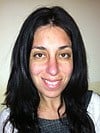Naso
Torah—with its rich narratives and poetry, glimpses of the Divine and profound wisdom—is a text we turn to for inspiration, intellectual stimulation and meaning. Yet there are moments in the Bible when culturally located prejudices come to the fore and the reader is left struggling with the tension between timeless writing and context-bound oppression. One such moment is the law of the sotah—or wayward woman—found in Parashat Naso.
Read More
